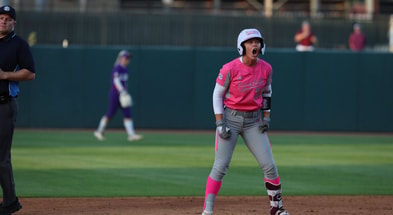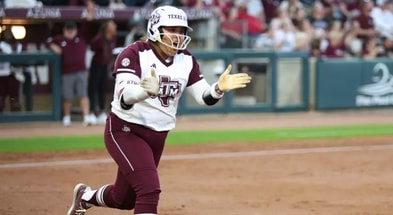Nobody Better Than Delaware’s Kristen Luzon in a Pinch

As March stakes go, they don’t come much higher than those that confronted Delaware coach Jen Steele in extra innings of a series finale against fellow Colonial Athletic Association contender Elon. The teams split the first two games of a weekend series. Now, in the bottom of the eighth of a deadlocked finale, the Blue Hens had runners on first and second with no outs.
Steele and her staff quickly debated whether to have Katie Scheivert put down a sacrifice bunt to move the runners over. The complication was that if successfully executed, the bunt would leave first base open and allow Elon to take the bat out of the hands of the next hitter.
Should they pinch hit for Scheivert instead? Could they justify pinch hitting for a .300 hitter?
Standing nearby, sophomore Ryleigh Thomas spoke up. It was time, she said with conviction. Another voice chimed in, reminding Steele of her own words earlier in the series. The coach had promised the team she wouldn’t worry about what might go wrong with any given decision. She wouldn’t second guess herself. She would trust the players come what may.
Well, yes, Steele thought to herself, but she meant trusting them to execute a squeeze play or a hit and run. She wasn’t talking about trusting their lineup decisions.
But they were right. Even Scheivert understood. It was Kristen Luzon’s time. When you have college softball’s best pinch hitter—and good luck arguing against the label—you need to use her when it matters.
Luzon smoked a ball into center for a single. She hit it almost too well, the line drive traveling with such pace that the runner on second didn’t have time to come home. But it was enough to break Elon’s back. With no outs and the bases loaded, Delaware had three chances to win on almost any contact. Sure enough, Morgan Hess’ one-out sacrifice fly delivered the 3-2 win.
Luzon pinch hit three times in the series. She got a hit each time. She has 11 hits this season, every one of them a pinch hit. She had 13 hits a season ago, 12 of them pinch hits.
Over the past two seasons, she’s right around .500 in nearly 50 at-bats as a pinch hitter.
As specialization continues to reshape college softball pitching staffs, we see more and more closers. Delaware has turned the trend on its head. Its closer doesn’t pitch. She carries a bat. And by embracing a seemingly small role, Luzon transformed herself into a big part of Delaware’s success.
“You feel so incredibly humbled as a coach that you have someone who can do that and that loves that role—because that is uncommon,” Steele said. “When you have a hitter who’s as consistent as Kristen, from my 20 years of coaching, typically that hitter would not be happy with that role. That is not a role they want. They want to be the everyday DP, everyday starter. But Kristen thrives in those moments of ‘Hey, you’re going now.’ She’s made for those moments.”
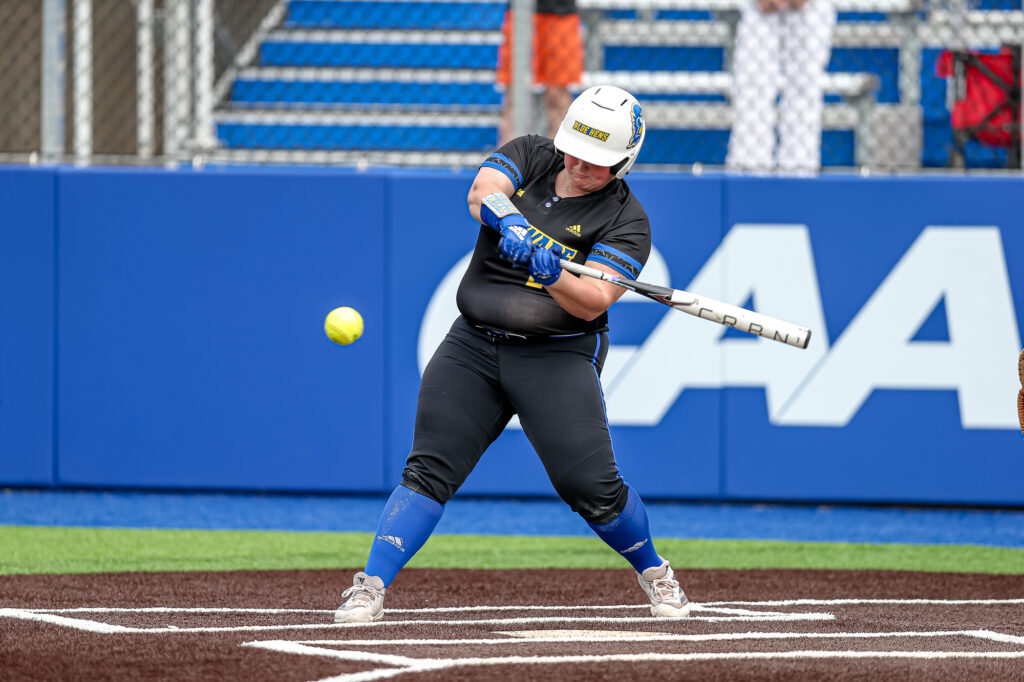
A Line Shift Mentality
Luzon hasn’t always been a pinch hitter, but she is in some ways uniquely qualified for the job. She was a two-sport standout growing up in Stony Point, New York, about 30 miles north of Yankee Stadium.
She was a four-year starter and two-time all-state selection on the softball field at North Rockland High School. She also excelled in ice hockey, thinking until at least midway through her high school days that she might pursue that sport in college instead of softball.
Softball requires collaboration, to be sure, but a lineup is in some sense more a federation than a unitary state. Sacrifices and situational hitting notwithstanding, a lineup is nine independent actors. A hockey lineup is more interdependent. A softball team would send its best hitter to the plate nine times in a row, if the rules allowed. A hockey player who tried to play every shift would keel over. In hockey, even as a top player, Luzon grew accustomed to giving way for the good of the team.
“In hockey you can only be on the ice for like seconds at a time, but you have such a big job in that time,” Luzon said. “I played defense, and you knew your one job in those seconds that you’re out on the ice for is to not let the puck hit the back of the net. I can relate that to hitting in my situation. Your one job is to execute this at-bat right now.”
Perhaps that’s why she wasn’t angry about not being in the starting lineup when her travel softball team faced off against a strong West Coast opponent during a PGF tournament in her senior summer. Although used to starting, she watched and waited as scoreless inning followed scoreless inning. Finally, she pinch hit in the bottom of the seventh. She swung at two pitches over head, then stepped out of the box and reset. When the pitcher’s two-strike pitch caught too much of the plate, Luzon’s walk-off home run won the game.
Still, it wasn’t a role she expected to reprise all that often in college. She started 16 times for the Blue Hens as a freshman but finished with as many strikeouts as hits. The thing is, for every Taylor Shumaker who plays and carries herself like a 30-year-old pro from the moment they step on the field, there are hundreds of freshmen who strike out as often as they get a hit. A lot of people struggle. Forget softball, college itself is a new world. It isn’t always easy. It wasn’t for Luzon.
Coming out of that first season, looking to simplify things, Steele said she wanted Luzon to focus exclusively on hitting. Luzon embraced the feedback. She went home and swung until her hands were raw.
She struck out in her first appearance as a sophomore, pinch hitting against East Tennessee State. She didn’t get on base in her second pinch hit appearance, either. But in her third game, she hit a pinch-hit single. She reached base by hit or walk in five of her next six plate appearances, all as a pinch hitter.
She started a two-out seventh-inning rally in a win against Iowa State. She hit a pinch-hit home run in the seventh inning against NC A&T, providing what proved to be the winning runs, then repeated the same feat in the sixth inning of a win against Elon.
Top 10
- 1Trending
Deion Sanders
refutes Nico Iamaleava report
- 2New
Kyren Lacy father
Pens heartfelt note
- 3
Kirby Smart
Reacts to Iamaleava news
- 4
Kyren Lacy
Reported cause of death
- 5Hot
Rece Davis
Decides on ESPN, FOX
Get the On3 Top 10 to your inbox every morning
By clicking "Subscribe to Newsletter", I agree to On3's Privacy Notice, Terms, and use of my personal information described therein.
For the season, she slashed .500/.556/.792 as a pinch hitter. This year, she picked up right where she left off.
“It’s been really cool because she’s a player that I always knew had the talent to hit at this level, but you know, college is hard and being away from home is hard,” Steele said. “I was wondering if she was going to get through the transition. And it never had anything to do with ability, but just how hard it is. So to see her thriving now and having the team rally behind her and have so much confidence in her has been a really cool thing to witness. She just wants to do her job for other people. She just wants to contribute. She just wants the team to win.”
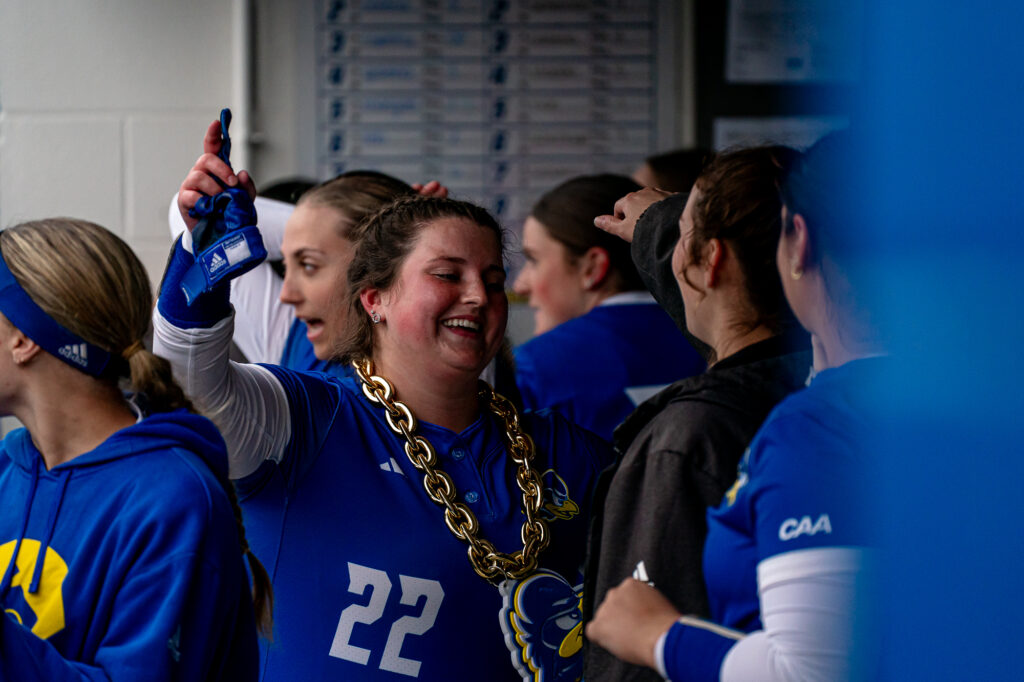
The Art of the Pinch Hit
A pinch hitter’s routines aren’t much different than those of teammates expecting three or four plate appearances. During the week, Luzon watches film on upcoming opponents and studies the scouting report. On game day, she’s one of the people trying to keep the mood light in warmups. But at some point before lineup cards are exchanged, she takes about 10 minutes for visualization work. She tries to imagine herself having success in the most stressful situations possible, down two runs in the bottom of the seventh, etc. If she’s prepared for that, she reasons, almost anything that follows in the actual game will feel easier.
When the game starts, she’ll chart the opposing pitcher—but she’s also alert to being one of the players on the top step, cheering for teammates and greeting them in the dugout.
At some point, she’ll feel assistant coach and former Michigan slugger Dorian Shaw’s eyes on her or see Steele moving toward her. There’s no time to get nervous. She just picks up her bat and steps in.
“We talk a lot about staying aggressive and not getting too passive,” Luzon said. “It’s knowing that if a pitch is thrown over that white part of the plate, I’m going. I think that mentality has helped me out a lot. I’m not waiting for a curveball or a screwball. I’m hitting a pitch that’s thrown over the white part of plate.”
By now, you want to know why she’s still pinch hitting. Why limit such an asset to one plate appearance per game. One roadblock is that Sydney Shaffer, Delaware’s best hitter and one of the best in the CAA, splits time between catcher and designated player. Another is that, in an admittedly small sample size, she just hasn’t looked as comfortable in occasional starts. Maybe that will be the story’s final act, a senior season twist.
But the flip side of the question is why does she need a different role? Luzon’s pinch hitting prowess isn’t merely worth the total bases she provides. Go back to the game against Elon a couple of weeks ago, and the teammates speaking up, telling coaches it was her time. With each hit, week after week and now season after season, belief builds. Luzon’s at-bats take on a life and energy of their own. What is it worth when, no matter the situation, everyone believes? If they can just get on base ahead of her, they have the secret weapon.
“Any time I’m in that box, I literally feel their energy from the dugout,” Luzon said. “I’m like ‘OK, I can do this. I have 23 other girls in that dugout who are behind me. I have my athletic trainers who are behind me. I have coaches who are behind me. Even the parents in the stands, I can feel their energy too. The support that I’ve been getting like from everyone has just been super amazing. And I think that support has driven like my confidence in such a positive way.”
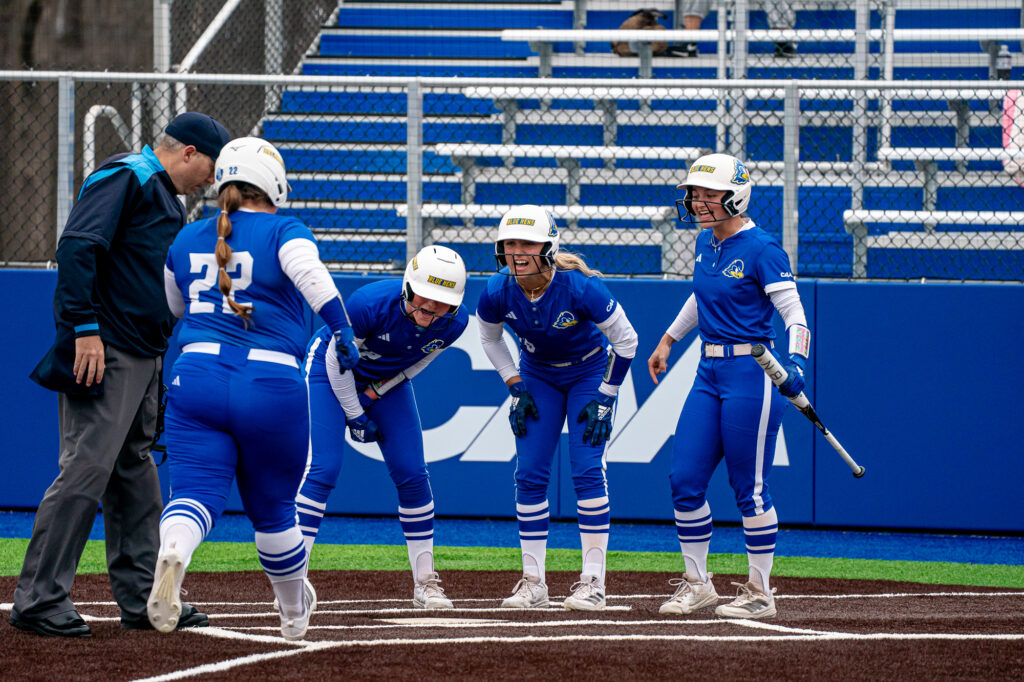
A New Perspective
A diehard Yankees fan, Luzon makes regular pilgrimages to Yankee Stadium with her dad. They’ve been going for as long as she can remember, even back to when cameras caught her munching on cotton candy as a little kid. For much of that time, she never gave much thought to the players she didn’t see on the field, the ones in the dugout waiting for their one opportunity.
She’s a little young to know names like Manny Mota, or even Lenny Harris, but last year, when fans were giving an unsuccessful pinch hitter a hard time, she bristled.
“You get up there and do it yourself then,” she recalled thinking. “Before, I really didn’t notice the guys that weren’t playing. Their role might seem so small and insignificant. But they have such a big job. They have one at-bat, maybe even one pitch to get their job done.”
Watching them, she began to understand what a lot of people already knew to be true of her.
Every team needs a Kristen Luzon. A lucky few will find one.







